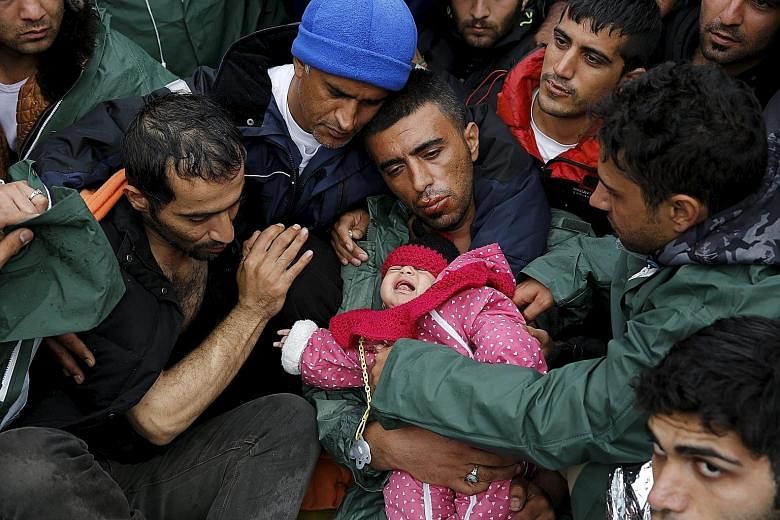BERLIN • Chancellor Angela Merkel vowed yesterday to stick to her open-door refugee policy, defying criticism at home and abroad which has intensified due to growing fears about a potential security risk after the terror attacks in Paris.
Her views are at odds with French Prime Minister Manuel Valls, who was quoted in a German newspaper yesterday as saying European countries are stretched to their limits in the refugee crisis and cannot take in any more arrivals.
In a 40-minute speech to the Lower House of Parliament, Dr Merkel stressed her commitment to her disputed refugee policy, saying Germany, Europe's economic powerhouse, has a duty to protect those fleeing war and conflict in the Middle East, Africa and Asia.
In a nod to critics in her Conservative party, especially in Bavaria, where most of the migrants enter Germany, she said migrants who do not need protection must be sent home. "But simply sealing ourselves off will not solve the problem," she added.
She repeated her "we will cope" mantra and reiterated her argument that Europe must tackle the causes of the crisis by working for peace in Syria and engaging Turkey as a partner in the refugee crisis.
Dr Merkel countered politicians in some countries who have warned that the refugee crisis has exposed problems in Europe's Schengen passport-free area, saying that states must develop it further by agreeing on migrant quotas. "A distribution of refugees according to economic strength and other conditions... and the readiness for a permanent distribution mechanism... will determine whether the Schengen area will hold," she said.
But Mr Valls was sceptical of the prospect of welcoming more refugees. "We cannot accommodate any more refugees in Europe, that's not possible," he told the Sueddeutsche Zeitung newspaper, adding that tighter control of Europe's external borders would determine the fate of the European Union.
"If we don't do that, the people will say: Enough of Europe," Mr Valls warned. His comments were published only hours before Dr Merkel was to meet French President Francois Hollande in Paris.
Mr Valls avoided criticising Dr Merkel directly for having suspended European asylum rules to allow in Syrian refugees stranded in Hungary. "Germany has made an honourable choice there," he said. But he signalled that her decision took Paris by surprise: "It was not France that said: Come!"
Germany will this week start deporting asylum seekers from the western Balkans whose applications have failed. Government sources said on Tuesday that Berlin had reached an agreement with Albania, Kosovo and Montenegro to allow it to repatriate asylum seekers whose identification papers had expired or been destroyed.
Many asylum seekers destroy their passports upon arrival in their destination country, one of the reasons why Germany has been able to deport only about 30 per cent of those rejected.
In September, Germany declared Albania, Kosovo and Montenegro "safe", meaning their citizens, like those of neighbouring Serbia, Bosnia and Macedonia, would automatically be ineligible for asylum.
Germany has identified for deportation some 150,000 asylum seekers, and Albania, Kosovo and Montenegro have agreed to recognise Berlin's identification procedure and its temporary travel document, or "laissez-passer".
The government also wants to be able to deport applicants from Pakistan and several African countries using this document.
Meanwhile, the French and German economy ministers on Tuesday proposed setting up a €10 billion (S$15 billion) fund to pay for tighter security, external border controls and care of refugees.
French Economy Minister Emmanuel Macron, speaking in Berlin, said he and his German counterpart Sigmar Gabriel had written to Mr Hollande and Dr Merkel suggesting the creation of the fund, which other European countries could join.
He said a joint response would avert the risk of France and Germany pursuing different agendas and weakening Europe. Mr Macron said he and Mr Gabriel would present a more detailed text by mid-December that would build on their earlier proposals regarding closer integration of the euro zone.
Europe is grappling with its worst refugee crisis since World War II. Germany so far has taken in the bulk of some one million people expected to arrive this year.
REUTERS

